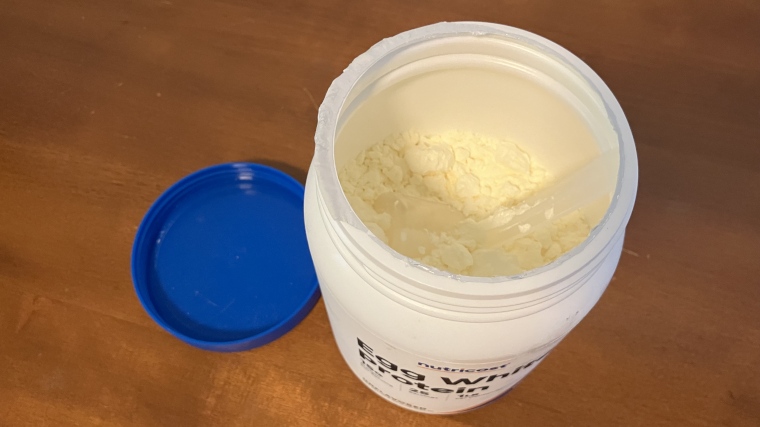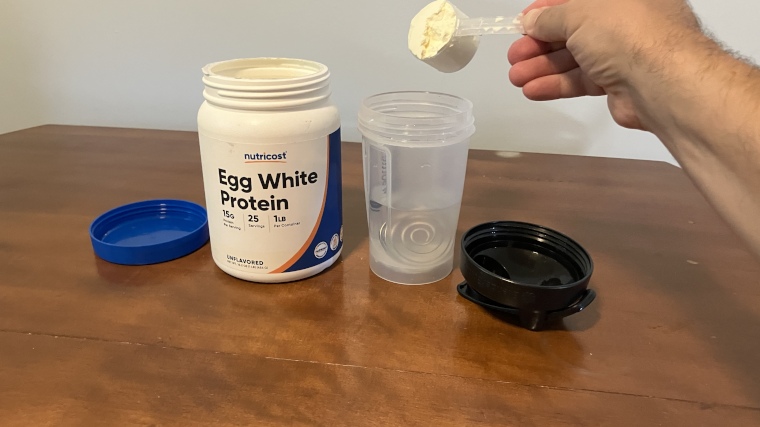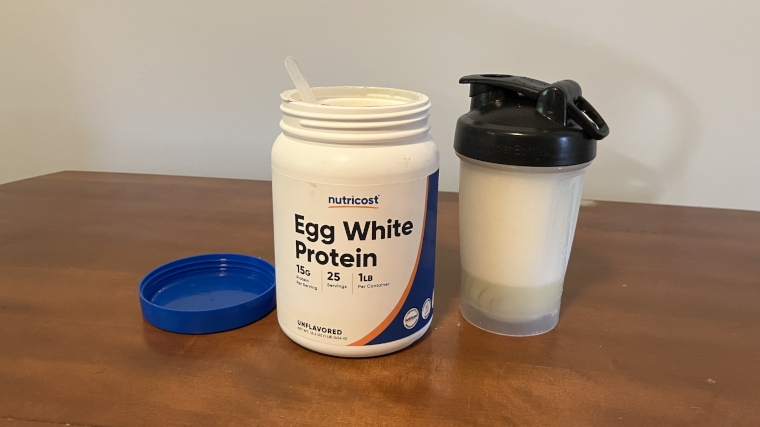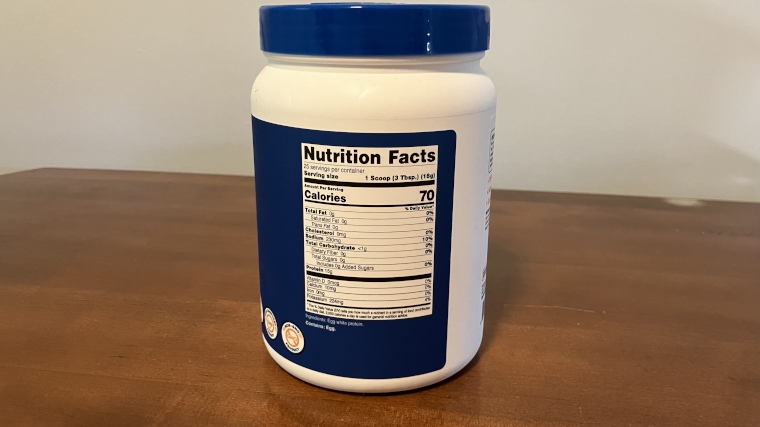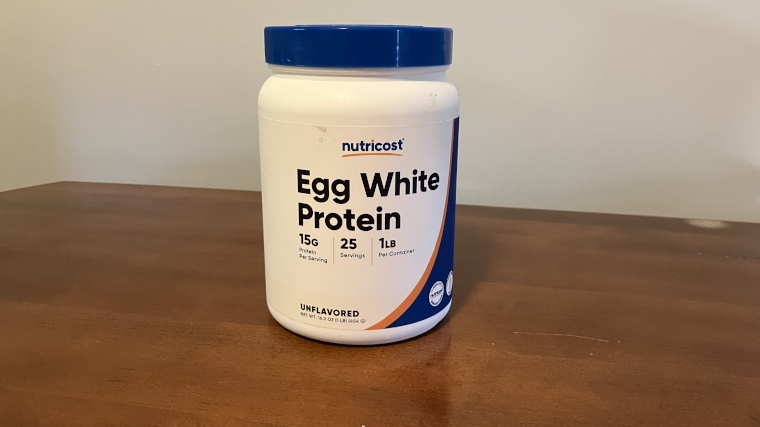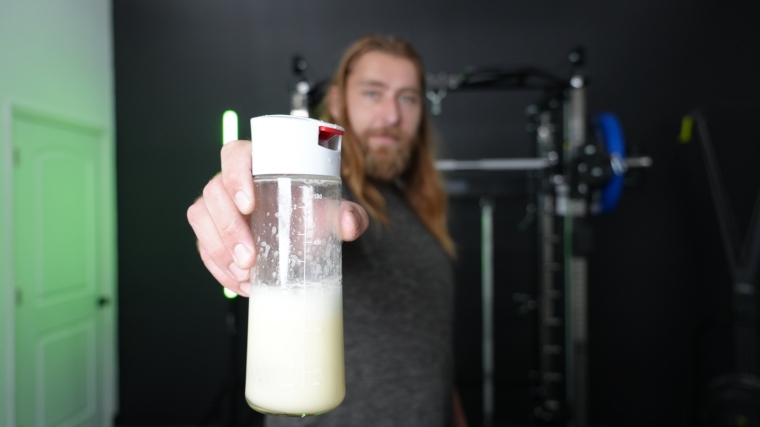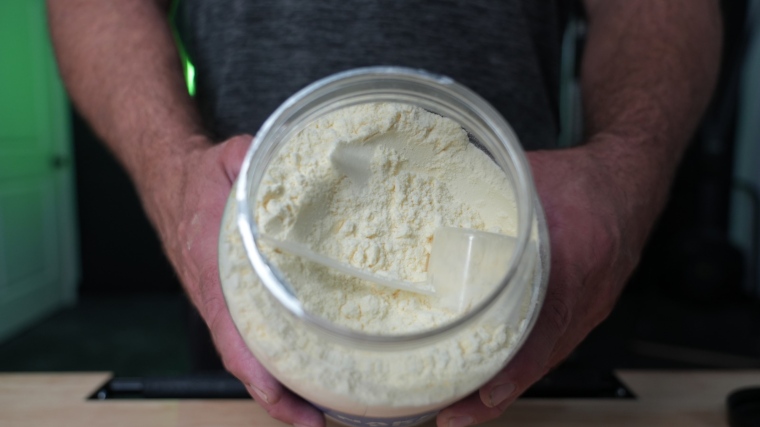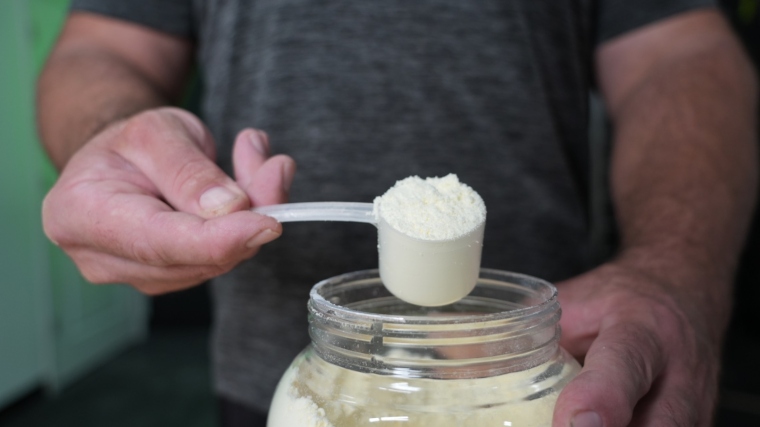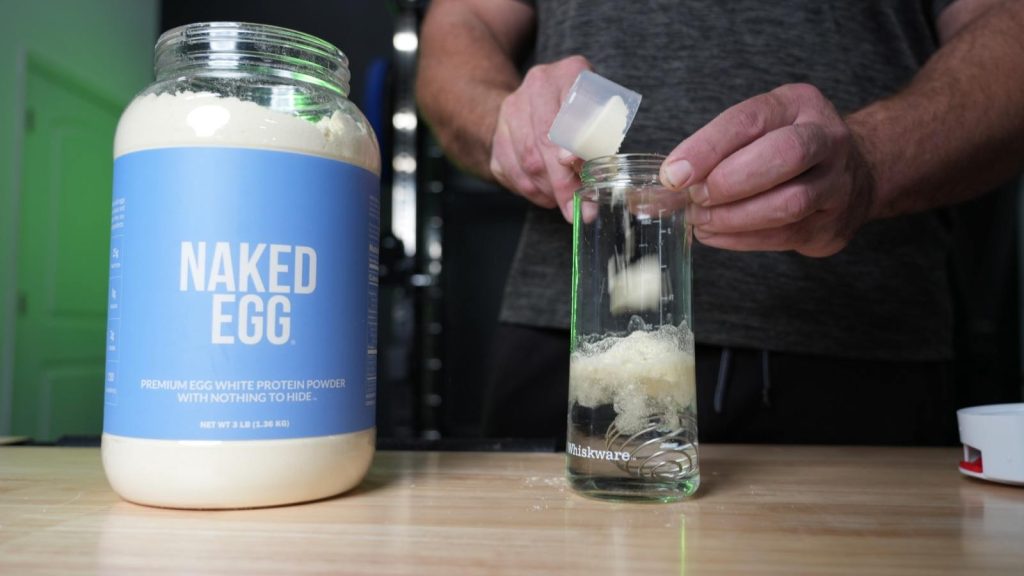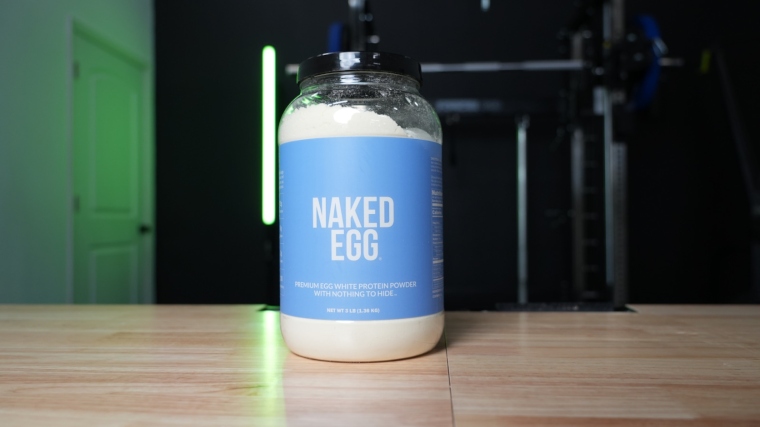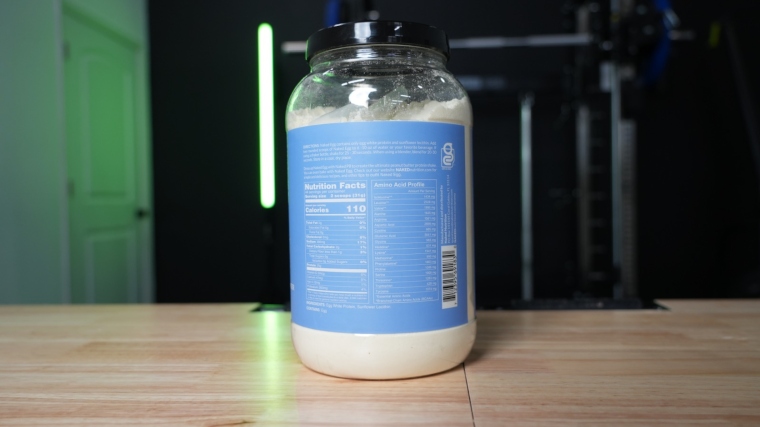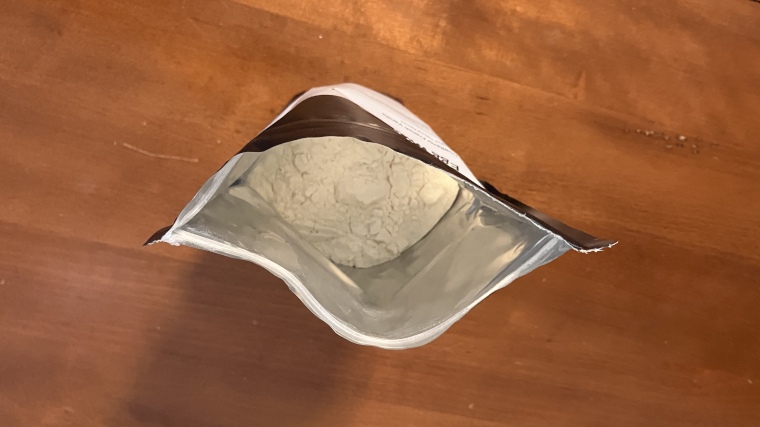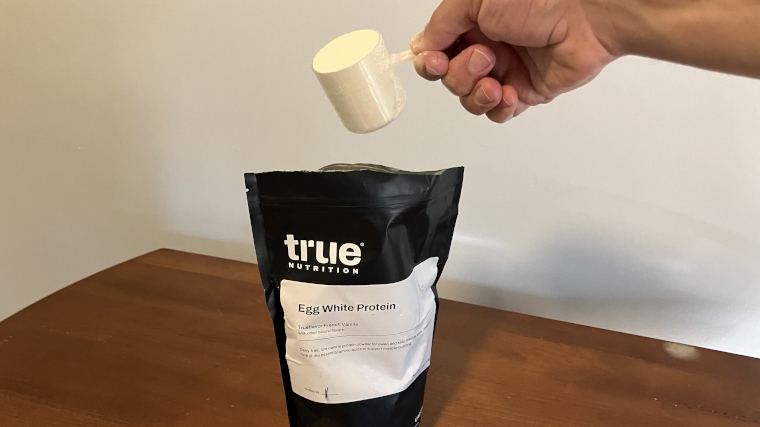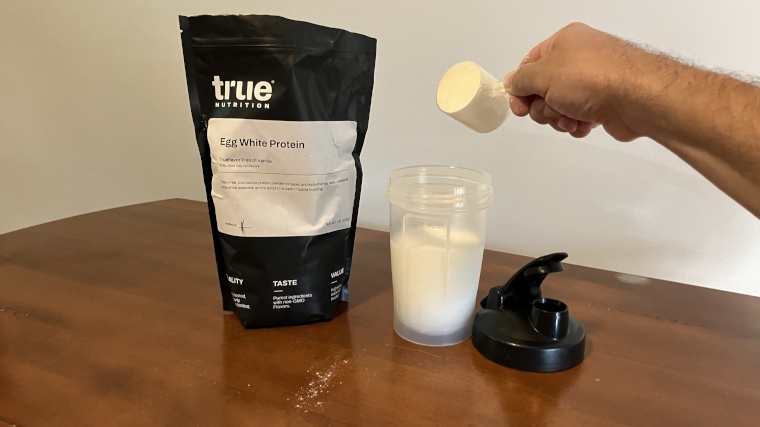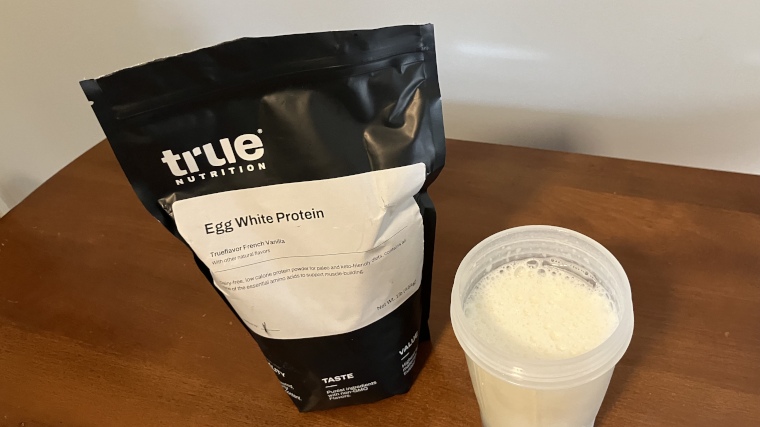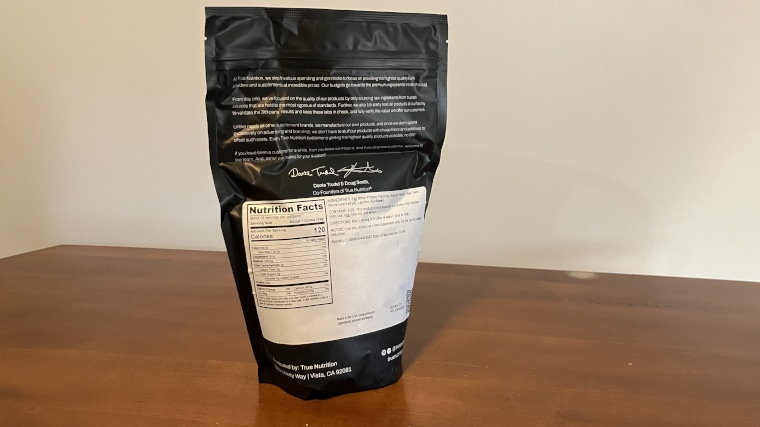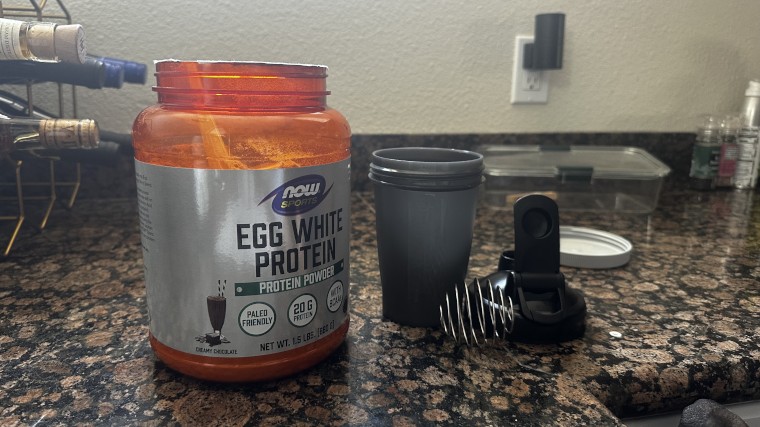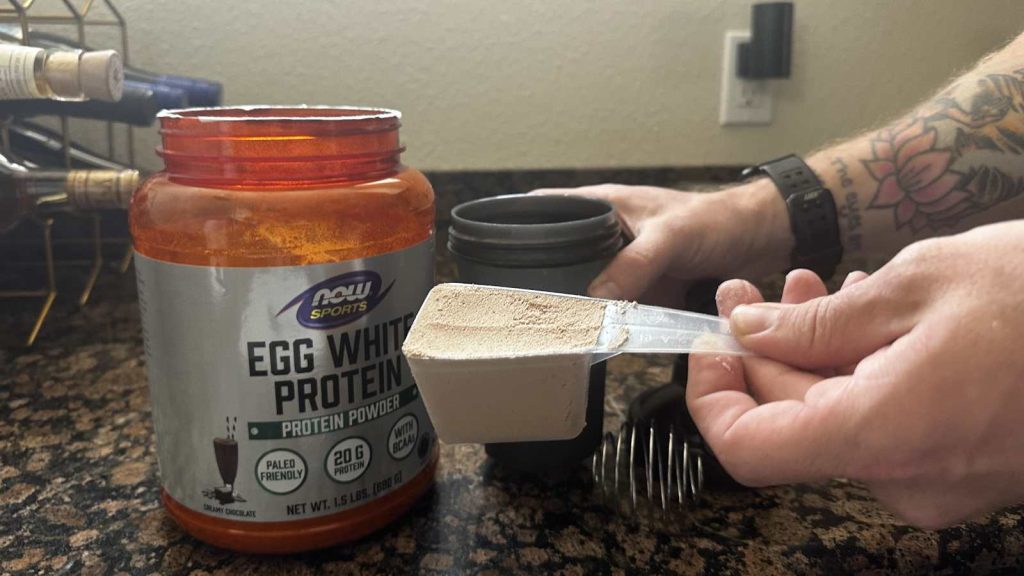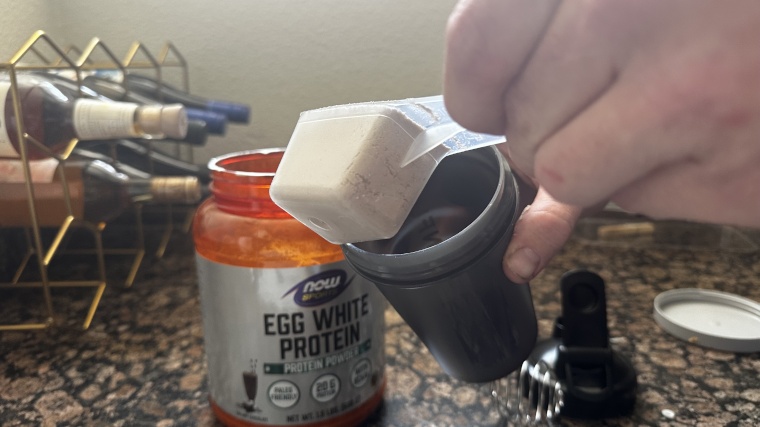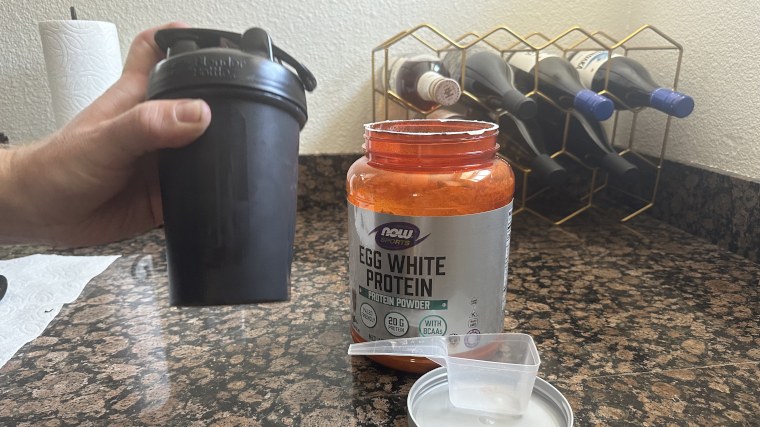Not getting enough protein? You might feel it in more ways than one. Protein helps make you feel full, helps build lean muscle (bodybuilders rely on protein for muscle hypertrophy), and can help you recover after a particularly intense workout, among many benefits. Studies also show that higher-protein diets can support weight loss when compared to a lower-protein diet. (1)
No matter what kind of brand or type of protein you wind up choosing, the best protein powders are super convenient for adding protein to your diet. If you’d rather get your protein from eggs and not the most common whey protein, then you’ve got options! Our team personally tested some of the best egg white protein powders and narrowed it down to the top five, each earning a specific badge of honor. Let’s get into the eggy-gritty.
The 5 Best Egg White Protein Powders of 2025
- Best Egg White Protein Powder Overall: Bulk Supplements Egg White Protein
- Best Egg White Protein Powder for Weight Loss: Nutricost Egg White Protein Powder
- Best Natural Egg White Protein Powder: Naked Nutrition Naked Egg
- Best Tasting Egg White Protein Powder: True Nutrition Egg White Powder
- Best Egg White Protein Powder for Smoothies: NOW Sports Egg White Powder
Medical disclaimer: The content on BarBend is meant to be informative in nature, but it should not be taken as medical advice. The opinions and articles on this site are not intended for use as diagnosis, prevention, and/or treatment of health problems. It’s always a good idea to talk to your doctor before beginning a new fitness, nutritional, and/or supplement routine. Individual needs for vitamins and minerals will vary.
How We Tested and Chose the Best Egg White Protein Powder
Our team of dietitians, personal trainers, athletes, and other health enthusiasts come together to analyze and test different protein powders for our reviews. Here, we’ve narrowed it down from over 100 protein powders before deciding on the top five best egg white protein powders.
Following BarBend’s supplement testing methodology, our team considers some of the most important factors in choosing a protein powder:
- Protein content: If you’re in the market for protein powder, then protein content is likely a top consideration for you. We’ve chosen the best egg white protein powders with a generous amount of protein per serving (pay attention to the grams of protein here).
- Taste: Want one of the best-tasting protein powders out there? Us, too! Our product testers provide honest feedback in terms of the flavor of the best egg white protein powders we tested (without the preservatives and allergens that might be present elsewhere).
- Solubility: We consider how easily the best egg protein powders mix into your favorite foods and drinks, which is a big factor for ease of use.
- Cost: Your budget is an important consideration when choosing protein powder — because no, muscle growth doesn’t have to be tremendously expensive. We’ve broken down the cost per serving for each of our top egg white protein powder picks.
- Formulation: As a dietitian, the ingredient list is one of the first things I look at in protein powders and other supplements. Whether egg white protein is the only ingredient or one of a few, we lay it out there so you can decide if a protein powder fits within your health and dietary goals (muscle mass, anyone?). We only chose egg white protein powders free of added sugar, too.
Best Egg White Protein Powder Overall: Bulk Supplements Egg White Protein
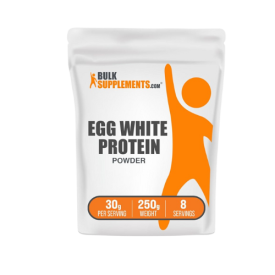
Boasting 30 grams of protein per serving, Bulk Supplements Egg White Protein Powder is easy to digest and free from lactose. At only 110 calories per serving, this is a geared toward building lean muscle.
Specs
- Protein Per Serving: 24g
- Flavors: Unflavored
- Main Ingredients: Egg white protein, sunflower lecithin, monk fruit
- Third-Party Testing: Yes
- Protein Source: Egg whites
- Price Per Serving: $1.94
The formulation of this protein powder, which earned the designation of best egg white protein overall, is pretty simple: egg white protein, sunflower lecithin, and monk fruit sweetener. Given these ingredients, Bulk Supplements Egg White Protein is suitable for the paleo diet and is keto-friendly.
Just be wary of the sodium content, encourages registered dieitian Chelsea Rae Bourgeois: “The sodium content in this protein powder is worth noting. You get 440 mg per serving, almost 20 percent of your recommended daily limit.”
Bulk Supplements is a popular brand with several nutrition supplements and products, each of which is third-party tested for purity and safety. You’ll pay a bit more for this particular egg white protein powder, though – it’s the most expensive per serving in our lineup at nearly $2 per serving.
Our product tester, a certified nutrition coach, has this to say about their experience using Bulk Supplements Egg White Protein: “I’ve gotta say, I don’t love this with just water. It’s not the strongest egg taste, but you definitely know what you’re drinking — plus, it’s salty. It’s much better if you bake with it, make oatmeal with it, or even toss it into a smoothie. Seriously, just don’t have it by itself. On its own, the taste is a 2 out of 5.”
Egg white protein powder isn’t as soluble as some of the best whey protein powders, which are more widely utilized than egg white protein powders. Our product tester notes, “After mixing with a shaker bottle, it’s going to basically look like liquid egg whites, especially where it foams on the top. After you get through the foam layer on top, though, it’s pretty thin. A 2 out of 5 for solubility.”
Other small details that you might not think about, such as the packaging of a product, can also impact its usability. Our tester picked up on these smaller details, saying, “In terms of accessibility, this one isn’t the best — the bag doesn’t reseal well, which isn’t great for ease of use or keeping it fresh. I’d definitely recommend putting it in another container.”
Best Egg White Protein Powder for Weight Loss: Nutricost Egg White Protein Powder
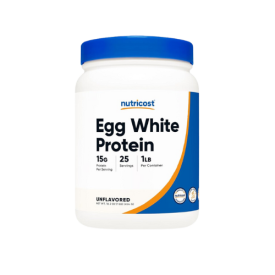
When you need an unflavored protein powder, Nutricost Egg White Protein comes with 15 grams of protein per serving. It's only got one ingredient (egg white protein), bringing with it a natural boost of 224 mg of potassium and 230 mg of sodium.
Specs
- Protein Per Serving: 15g
- Flavors: Unflavored
- Main Ingredients: Egg white protein
- Third-Party Testing: Yes
- Protein Source: Egg whites
- Price Per Serving: $1.48
Nutricost Egg White Protein Powder is one of the best egg white protein powders for weight loss for a few reasons. First, it has a super simple ingredient list — just pure egg white and nothing else! The lack of sweeteners means you can conveniently add extra protein to many of your favorite foods without imparting a sweet flavor.
Registered dietitian Chelsea Rae Bourgeois notes that the protein content isn’t super high here, but that can be a good thing: “I love that this option is available for those who either don’t need as much protein between meals or who want to include more protein in their baked goods.”
Matt Cummings, our expert product tester and BarBend fitness writer, used Nutricost Egg White Protein Powder with both water and milk and says, “I would definitely recommend mixing this milk over water. I suffered through the water mix, but it did not taste good. Milk at least gives it some texture and flavor. I mixed it in with scrambled eggs one time and it made a little mess, but when properly prepared, I think it would be a quick and easy protein boost.”
While this particular egg white protein powder is unflavored, there is still a taste to it. Cummings explains that the protein powder has “No flavor, but I noticed the saltiness,” giving Nutricost Egg White Protein Powder a 2 out of 5 for flavor on its own. When used in scrambled eggs, though, Cummings gives it a 5 out of 5: “I didn’t even notice it.”
Egg white protein powders aren’t known for being easily mixed into liquids like grass-fed whey protein (for example), which is why this scores a 2 out of 5 for solubility from Cummings, who summarizes: “I wouldn’t use this like a typical protein powder shake. It’s meant to be used as an egg replacement in cooking, so in that situation, I’m sure it would be fine. But the taste and solubility make it pretty tough to drink. I mixed a scoop in with scrambled eggs once and I would definitely use it that way.”
Best Natural Egg White Protein Powder: Naked Nutrition Naked Egg
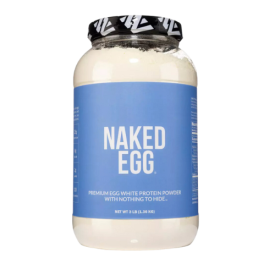
An alternative to whey and casein protein powders, Naked Nutrition Naked Egg's fat-free formulation delivers 25 grams of protein, less than 2 grams of carbs, and 110 calories per serving. It's made from non-GMO chicken eggs that, according to the brand, are processed into a powder in under one day to retain a complete amino acid profile.
Specs
- Protein Per Serving: 25g
- Flavors: Unflavored
- Main Ingredients: Egg white protein, sunflower lecithin
- Third-Party Testing: Yes
- Protein Source: Egg white
- Price Per Serving: $1.55
Naked Nutrition Naked Egg earns the designation of best natural egg white protein powder because of its simple ingredient list and use of non-GMO chicken eggs. In addition to egg white powder, sunflower lecithin is added as an emulsifier, helping to improve its solubility. As an RD, I’d give it a 5 out of 5 for formulation because of its simple ingredients list and high protein content. Fellow RD Chelsea Rae Bourgeois agrees, saying, “Naked Nutrition also does a great job of providing its consumers with information beyond the nutrition facts. I love that you can see the amino acid profile of this product. Knowledge is power, after all!”
Kate Meier, certified personal trainer and BarBend editorial team member, is one of our product testers and has this to say about her experience using Naked Nutrition Naked Egg: “I tried it two ways: First, I blended this with strawberries, banana, and Lactaid. You can taste a flavor there; it’s hard to pinpoint what it is. Then I tried it with a cup of hot, black coffee, which I threw in the blender, making the coffee a little frothy. I actually liked it better this way! All in, I’d give it a 3 out of 5 for flavor because there isn’t much there, which can be a good thing!”
For solubility, Meier says, “I doubt anyone would mix this with just water, but I did to test solubility. It’s about a 3 out of 5; mixes decently enough, but with some very small flecks still there. In the smoothie, it was fine. This surprised me in a good way. If you need an alternative to whey or casein protein, this isn’t a bad option.”
Rosie Borchert, BarBend fitness writer and another one of our expert testers, prefers using egg white protein in baking, noting, “This egg white protein powder didn’t form hard peaks when I used an electric hand mixer, however, when used in my egg white cups (because Starbucks is too expensive for my blood), they worked well. There isn’t a strong taste to this powder, which is a win.”
Best Tasting Egg White Protein Powder: True Nutrition Egg White Powder
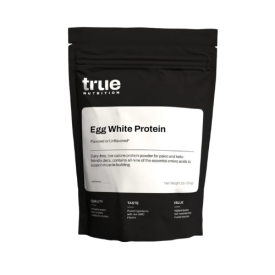
True Nutrition Egg White Protein comes in at a whopping 27 grams of protein per serving in the unflavored variety. And there's plenty of variety here with 34 flavors to choose from, whether you prefer fruit flavors, chocolatey, or unexpected delights like Chocolate Churro and Frosted Carrot Cake.
Specs
- Protein Per Serving: 24-27g
- Flavors: Unflavored, Chocolate Fudge Brownie (Stevia), French Vanilla (Stevia), Chocolate Peanut Butter Cup, Chocolate Fudge Brownie, Cookies n’ Cream (Stevia), French Vanilla, Cookie Butter, Cafe Mocha (Stevia), Salted Caramel (Stevia), Strawberry Sorbet (Stevia), Chocolate Churro (Stevia), Strawberry Banana Shake (Stevia), Chocolate Coconut Bar (Stevia), Marshmallow Treat, Banana Smoothie (Stevia), Natural Fruit Punch, Toasted Coconut (Stevia), Chocolate Covered Banana (Stevia), Cookies n’ Cream, Caramel Macchiato (Stevia), Cinnamon Toast Swirl (Stevia), Lemon Cake (Stevia), Cinnamon Bun (Stevia), Orange Cream (Stevia), Chocolate Covered Strawberry (Stevia), Horchata (Stevia), Swole Whipd, Red Velvet Cake (Stevia), Maple Pecan (Stevia), Frosted Carrot Cake (Stevia), Chai Latte (Stevia), Chocolate Thin Mint (Stevia), White Chocolate Peppermint Bark (Stevia)
- Main Ingredients: Egg white powder, natural & artificial flavors and colors, stevia, sunflower lecithin; some flavors contain sucralose, acesulfame potassium, and/or guar gum
- Third-Party Testing: Yes
- Protein Source: Egg white
- Price Per Serving: $1.79
If you’re looking for the best-tasting egg white protein powder, look no further than True Nutrition Egg White Powder. With an almost overwhelming list of flavor options, True Nutrition earned the highest score for flavor among our top picks for best egg white protein powders. Matt Cummings, expert tester and BarBend fitness writer, gives it a 4 out of 5 for flavor: “I tried out the French Vanilla flavor. The vanilla wasn’t overwhelming, but I definitely noticed it — in a good way.”
While many of the other best egg white protein powders might be better suited for baking or mixing into foods, Cummings encourages trying this one on its own — “I recommend trying this egg white protein powder with milk if you’re going to drink it. It could also be used in baking, just be mindful of the flavor.”
While it tastes better than some of our other top picks on its own, this egg white powder is still tricky to blend into a smooth consistency. Cummings has this to say about its solubility: “It mixed pretty well, but there were a few clumps remaining. I just shook it up before each sip.”
I like that these are high in protein per serving (it’s similar to the protein content of some of the best whey isolates), but I don’t love the use of artificial flavors and other added ingredients in some of the flavored options. Registered dietitian Chelsea Rae Bourgeois explains: “I’m a huge fan of chocolate, but the sodium content in their Chocolate Fudge Brownie flavor is a deal breaker for me. You get 490 milligrams per serving, which is more than 20 percent of the recommended limit for the average healthy adult. And it’s not the only flavor high in sodium. Do your research before ‘adding to cart!’” “
Like other egg white protein powders, True Nutrition Egg White Powder is higher in sodium than some of the more common protein powders like whey protein. That’s not because of any added salt, though — it’s just the natural sodium content of egg whites, which becomes more concentrated in powder form.
Best Egg White Protein Powder for Smoothies: NOW Sports Egg White Powder
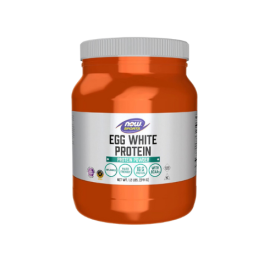
At 16 grams of high-quality protein per serving, NOW Sports Egg White Protein only packs 80 calories into each serving, leaving a lot more room for whatever else you want in your meal plan. It's GMP quality-assured and is tested for over 220 banned substances.
Specs
- Protein Per Serving: 16g
- Flavors: Unflavored
- Main Ingredients: Egg white powder
- Third-Party Testing: Yes
- Protein Source: Egg white
- Price Per Serving: $1.33 (1.2 lb. container) or $1.06 (5 lb. container)
If you’re a big fan of eggs, why not add them to your smoothies in a safe way (not drinking them raw)? You can do just that with NOW Sports Egg White Powder, which earned its title as the best egg white protein powder for smoothies. Given that the only ingredient is egg white powder, I give it a 5 out of 5 for formulation since there aren’t any additives or artificial ingredients.
While lower in protein compared to other egg white protein powders (16g of protein per serving), that’s not necessarily a bad thing if you’re adding it to smoothies. The best protein shakes or smoothies can often have other high-protein ingredients like Greek yogurt or nut butter, so you don’t necessarily have to rely on the protein from the protein powder alone.
Like many of the egg white protein powders on our list, this one doesn’t fare too well in terms of taste when used on its own. Our expert tester, a certified nutrition coach, says: “I hate to say it, but, yuck, taste-wise. It’s got big sulfur vibes, with eggy smells and taste. I was surprised because I’m a fan of NOW supplements. This only gets a 2 out of 5 for taste.”
Not surprising for a plain egg white powder, NOW Sports Egg White Powder doesn’t mix great in water. From our product tester: “It only gets a 1 out of 5 for solubility. The whole bottle filled up with foam like I’d whipped an egg white instead of tried to stir in protein powder.” However, it’s important to note that you likely won’t have as much of a frothy reaction when you mix the protein powder into a smoothie versus plain water.
Despite lower taste and solubility scores, our tester adds a positive note: “The good thing here? While it’s low in protein for a protein powder at 16 grams, it’s also only got 80 calories”, which is also a pro if you’re adding it to smoothies without wanting to add a significant amount of calories.
Benefits of the Best Egg White Protein Powders
There are a lot of health benefits of eggs, including their rich protein content and concentration of branched-chain amino acids (BCAA). While they aren’t a fit for vegans, eggs are compliant with many other special diets — even the Mediterranean diet allows egg whites! While this isn’t an exhaustive list, let’s look at some of the benefits of egg white protein powders.
- Low in carbs: Most types of egg white protein powders are low in carbohydrates, making them suitable for low-carb diets like keto.
- Dairy-free: Unlike the more popular whey protein powder, egg white protein powder is dairy-free. This means it’s a suitable option if you have a milk allergy or lactose intolerance! If you’re loving the possibilities, check out our list of the best dairy-free protein powders.
- Complete protein: Egg whites are considered a complete protein (containing all of the essential amino acids your body doesn’t make on its own) with a high digestibility score. (2)
How Much Do The Best Egg White Protein Powders Cost?
The best egg white protein powders vary in price, and those small differences in cents can add up in your budget when you use protein powder consistently. The cheapest egg white protein powder is a little over $1 per serving when purchased in bulk (a 5 pound canister) while the most expensive in our lineup is closer to $2 per serving.
| Best Egg White Protein Powder Overall | Bulk Supplements Egg White Protein | $1.94 |
| Best Egg White Protein Powder for Weight Loss | Nutricost Egg White Protein Powder | $1.48 |
| Best Natural Egg White Protein Powder | Naked Nutrition Naked Egg | $1.55 |
| Best Tasting Egg White Protein Powder | True Nutrition Egg White Powder | $1.79 |
| Best Egg White Protein Powder for Smoothies | NOW Sports Egg White Powder | $1.06-$1.33 |
What To Consider Before Buying the Best Egg White Protein Powder
Egg white protein powders can be a good choice for some, but they aren’t suitable for everyone. There are some unique considerations when using egg white protein powder.
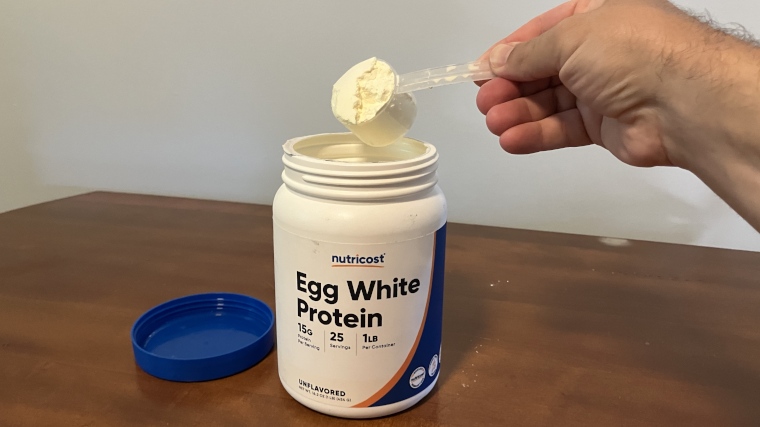
Allergies
While egg white protein powder is a great alternative to more traditional protein powders for things like milk and soy allergies, you’ll need to steer clear of them if you have an egg allergy. Otherwise, egg white protein powder is gluten-free and lactose-free, and it’s generally well-tolerated with few side effects thanks to its higher digestibility.
Sodium content
Egg whites are a natural source of sodium (55 milligrams of sodium per egg white, according to the USDA), so some of the best egg white protein powders are high in sodium (some are as high as 20% of the recommended daily value).
Consuming a high-sodium diet can be potentially harmful if you have certain health conditions like heart disease, high blood pressure, or kidney issues. As always, consult your healthcare provider before trying a new protein supplement if you have dietary restrictions.
(One of the good news about egg white protein powder is that it’s free of cholesterol since the cholesterol in eggs is from the yolks, not the whites!)
Solubility
Unlike a plant-based source of protein found in the best vegan protein powders or whey protein, egg white protein is notorious for not mixing super smoothly into liquids. Don’t expect a smooth, creamy protein shake if you mix egg white protein powder into water or milk. Instead, egg white protein powder can be a better fit for mixing into smoothies or using in baking, which is what many of our product testers prefer to do.
Best Egg White Protein Powder FAQs
Which is the best egg white protein powder?
Bulk Supplements Egg White Protein is one of the best egg white protein powders with a protein-rich, no added sugar formulation. Egg white protein powder is paleo-friendly and suitable for keto diets (as long as it’s free of regular sweeteners), and it’s also a good option if you have a milk allergy or sensitivities to dairy products.
Is egg white protein powder good?
Egg white protein powder is a good source of high-quality protein, and unlike whey protein powder, it’s paleo-friendly. Egg white protein powder doesn’t mix as smoothly into water as other protein powders can, but it has the advantages of being milk- and soy-free. Due to its lower solubility, egg white protein powder is more suitable for adding to other foods to boost their protein content, such as when baking, versus drinking as a standalone protein shake.
Is egg white powder and egg white protein the same?
Egg white protein is composed of powdered egg whites, the most protein-rich part of the whole egg. So yes, egg white powder and egg white protein are the same!
What is the best-tasting egg white protein powder?
True Nutrition Egg White Powder earned our designation as the best-tasting egg white protein powder. This particular egg white protein powder earned the highest flavor score from our expert product testers, and there are tons of flavors to choose from, both with stevia and artificial sweetener options.
References
- Leidy HJ;Clifton PM;Astrup A;Wycherley TP;Westerterp-Plantenga MS;Luscombe-Marsh ND;Woods SC;Mattes RD; (2015). The role of protein in weight loss and maintenance. The American journal of clinical nutrition. https://pubmed.ncbi.nlm.nih.gov/25926512/
- Puglisi, M. J., & Fernandez, M. L. (2022, July 15). The health benefits of egg protein. Nutrients. https://www.ncbi.nlm.nih.gov/pmc/articles/PMC9316657/

